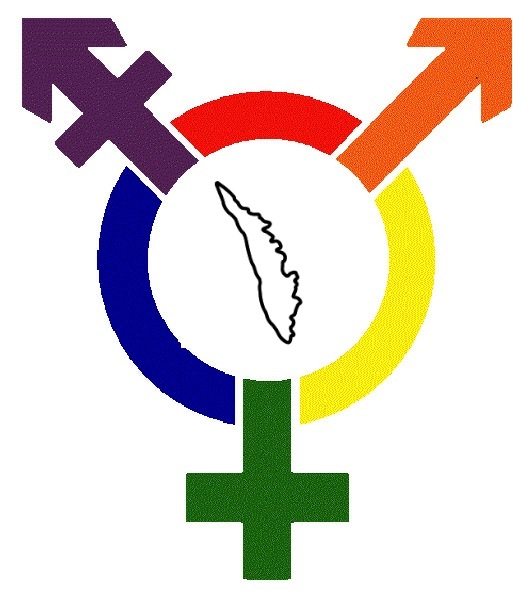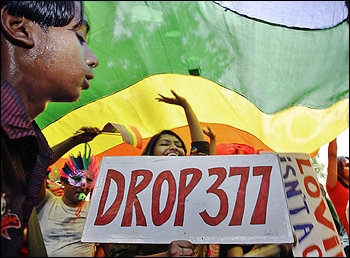Telangana Hijra Intersex Transgender Samiti responds to MSJE Transgender Rights bill (2015)
To,
Smt. Ghazala Meenai,
Joint Secretary (SD),
Room No. 616, ‘A’ Wing,
Shastri Bhawan,
New Delhi – 110 001
Dear Ma’am,
Subject: Recommendations on Rights of Transgender Persons Bill, 2015 released by the Ministry of Social Justice & Empowerment
We, the Telangana Hijra Intersex Transgender Samiti held a consultation on the Government of India’s Rights of Transgender Persons Bill, 2015 on the 30th of December. The Consultation brought together community members from across Telangana and Andhra Pradesh at various communes of hijra and transgender people in Hyderabad to discuss the new bill which has been made available on the Ministry of Social Justice and Empowerment’s website. We subsequently participated in a consultation on this held by the South India Transgender Samithi of which we are a constituent, which brought together community members from across South India at the Indian Social Institute in Bangalore, on the 30th of December.
The unanimous position arising from this consultation was that the deadline of 4th January, 2016 given by the government to submit comments on the Bill was incredibly short and unfeasible. For example we were only able to properly discuss the bill face-to-face with community members from Hyderabad for their input, and we had only input by phone from some members in the districts. It was agreed by all present that the deadline needs to extend by at least by 45 days with the end date for recommendations being 15th February 2016. During this period the government of India must take the initiative to consult all community members. This is feasible given the small size of our community. Without such effective consultations and time period given the entire exercise will prove to be a failed one that disregards the varied deeply personal and political struggles of the transgender and intersex communities for self identification and dignity.
In terms of substantively discussing the Bill, the following issues were flagged as seriously worrying:
- IDENTITY: The entire struggle of transgender and intersex people is for us to be able to live in our chosen identities. However, the bill does not provide a mechanism for self identification – instead the autonomy of the individual is severely diluted through the proposed certification process of a complex two-tiered mechanism which risks trapping transgender and intersex individuals in a bureaucratic apparatus to obtain basic recognition of their identity. It runs contrary to the Ministry of Social Justice and Empowerment’s very own report of 2013 on Transgender people and the principle of self-identification mandated in the NALSA vs. UOI judgment of the Supreme court, which proposed a minimum of procedural barriers for asserting one’s identity. We likewise propose an attestation process through a notarized affidavit to be the only relevant document for change of name and gender on all forms of ID with no insistence on Sexual Reassignment Surgery (SRS), Hormone Replacement Therapy (HRT), psychiatric certificates etc. Many of us in the transgender and intersex community have struggled with the deeply unscientific understanding of psychologists, psychiatrists, magistrates, district collectors, social workers, etc. who pathologize the transgender and intersex community and we are not comfortable with them having authority over declaring people as transgender or intersex. Above all, it is both paramount and the inviolable duty of the state under the NALSA vs. UOI mandate of the Supreme court to preserve the autonomy and the sole prerogative of the transgender or intersex individual to decide their chosen gender. Once a transgender or intersex person has filed the notarized affidavit attested by a district magistrate, all government and private bodies that produce identifying documents and certificates, including ration cards, driving licenses, gas connections, private/public educational certificates, bank accounts passports, PAN card, voter ID card should be compelled by law to change the name and gender of the person on the ID/certificates/documents they have issued in the past. They should only list the changed name and gender, and not provide both names as alias the way that ration cards currently function.
- CERTIFICATION: For benefits from the state, there could be a certification process, but the certification panel needs to include a majority of transgender and intersex people from all the diverse identity backgrounds – equal numbers of transwomen, trans men, intersex, hijra, shivashakti, jogappa, mangalmukhi, aravani, jogta, etc. that are locally and culturally relevant. The composition of the transgender and intersex people on the board should rotate and change every year. Any psychiatrists/social workers/government administrators on the board must be approved by the community members, and the community members should constitute the majority of the board.
- INTERSEX: Intersex people’s concerns should be incorporated into this bill and they should be included in the scope of the bill. The bill’s title should be expanded to read as “The Rights of Transgender and Intersex Persons Bill”, and every mention of “transgender person” in the bill should be replaced with “transgender or intersex person”.
- PENALTY: The Bill in its present form is at most a reflection of intent, but has no clauses that elaborate on the penalties for non-compliance. If there no penalties for defaulting on the provisions of the Bill then the bill will be completely unenforceable and will be nothing more than a piece of paper. Such a penalties section was part of Chapter IX, Section 49-50 of the private member’s Rights of Transgender Persons Bill 2014 Bill No. XLIX of 2014 as passed by the Rajya Sabha. It also does not specify a clear line of duties and responsibilities when it comes to governmental and non- governmental agencies. Beyond that, it was also felt that the Bill needs to cover a more specific range of offences against the community beyond what it already does, including atrocities, police violence, name-calling, lack of access to public and religious spaces, and exclusion even from burial grounds.
- VIOLENCE: The way the bill defines violence is seriously flawed. To start, it is limited to “intentional use of physical force or power” which includes self harm. First of all, defining physical harm as having to be intentional to be considered by this bill limits the reach of the bill and compromises cases of violence on transgender and intersex people by requiring proof of the intention of the assailant/perpetrator. Also since suicide rates are very high in the transgender community it is worrying that self harm is also treated on the same footing as other forms of violence – this would effectively make most transgender people targets of this bill and make people’s lives even more miserable when they act on suicidal feelings. We welcome the revision of the IPC to protect transgender and intersex people from sexual assault which is a frighteningly regular source of violence, and this should be implemented for all transgender and intersex people regardless of the physical/surgical state of their bodies. Section 377 of the IPC should be changed so that when transgender or intersex people are sexually assaulted only the rapist is punishable but not the victim/survivor regardless of their body and chosen gender, and consensual sex between any two people should not be criminalized. This bill also does not take emotional or verbal violence against transgender and intersex people seriously, nor does it take adequate measures to guard against major perpetrators of violence against transgender and intersex people: police, partners/clients, and the family. The police are treated as protectors of transgender and intersex people and there are sections of the proposed bill guarding against police inaction if crimes occur on transgender people, but nothing to guard against or effectively punish atrocities by police. Also, transgender and intersex people who are often survivors of police repression, atrocities, entrapment and corruption, should be able to directly approach the Executive Magistrate on cases of violence, if they are not comfortable approaching the police, as per chapter II, Section 10 of the Rights of Transgender Persons Bill 2014 Bill No. XLIX of 2014 passed by the Rajya Sabha. Specific groups also must have protection mechanisms for the specific kinds of atrocities and violence they face: for Jogappas protection from temple authorities, for transmen who are forcibly married it is the husband and in-laws, for hijras in sex work protection from police and clients, and for many transgender and intersex people, especially in childhood, it is the family and school that becomes their source of violence.
- EMPLOYMENT: Employment is a major problem faced by transgender and intersex people and the proposed government bill has ended up de-incentivizing employers in the private and government sector from considering transgender and intersex people for employment by altogether deleting sections 22, 23 and 24 of the Rights of Transgender Persons Bill No. XLIX of 2014. As per that Section 22 of that bill, we demand a clear demarcation of 2% reservations in every government or government aided establishment. With transgender and intersex people being such a stigmatised minority within the proposed OBC category, and SC/ST transgender and intersex people also being a stigmatised minority within the SC/ST category, we fear that mere inclusion in those categories would not suffice to produce even a single jobs for any transgender or intersex individuals. When it comes to the issue of reservations, we as a community would like a clearly demarcated internal reservation quota based on gender – within the SC/ST or OBC categories depending on whether the transgender/intersex individual is born SC/ST or not, respectively. As per the former Section 23 of the Rights of Transgender Persons Bill No. XLIX of 2014, we also ask that the employers in the private sector with transgender/intersex employees comprising 2% of their overall workforce in India be incentivized with special benefits or tax exemptions, and with a monitoring mechanism for oversight. Across public and private sector, transgender/intersex employees must be have a protected class status as in many other developed democracies. Section 24 of that bill also provided for a Special Employment Exchange for employers to furnish information on such vacancies for transgender people, and section 17 provided for an unemployment allowance to unemployed transgender people registered with special employment exchange for more than 2 years – we ask for these sections to be reinstated and to include intersex people. Without all of these provision, no real employment opportunities will arise for transgender and intersex In that context, already after the NALSA judgment, we have seen society and the police intensify the criminalization of sex work and begging, on the assumption that other jobs are available. We demand the decriminalisation of these forms of work and the implementation of all the proactive measures listed above to provide other forms of livelihood to transgender and intersex people.
- EDUCATION: We demand the clear demarcation of reservations of 2% in education in the government owned and funded institutions as laid out in Chapter V, Section 21 of the private member’s Rights of Transgender Persons Bill 2014 Bill No. XLIX of 2014 as passed by the Rajya Sabha. Also, Chapter IV on education only safeguards the rights of transgender students in government and government aided educational institutions and keeps the large private sector in education exempt from safeguarding the rights of transgender students. This chapter must apply to the entire educational sector regardless of whether the institution is government owned, government funded or private, and it must include intersex students.
- COMMISSIONS AND COURTS: The bill also removes some crucial provisions from the Rights of Transgender Persons Bill No. XLIX of 2014 as passed by the Rajya Sabha, such as National and State Commissions for Transgender Persons, special transgender courts, and access to free legal services under the Legal Services Authorities Act, 1987. Many transgender people feel these would be essential to strengthen the struggle for transgender dignity, and necessary for the enforcement of this bill, although whether they empower transgender people would depend on the details of the proposed structure. For example, it is important that these structures function with sensitivity, and speed, that any decision making process should have a majority representation by diverse members of our community, and the structure should be accessible to all community members.
- IMPLEMENTING NON-GOVERNMENTAL AGENCIES: This bill, along with previous bills, has described in Chapter VI a process of ‘rehabilitation’ for transgender people to be formulated in consultation with, and with financial assistance to the “non-governmental organizations” working for the cause of transgender persons. We do not agree that we need to be‘rescued’ or ‘rehabilitated’ since nothing is wrong with us; instead there are problems with societal respect for us – hence we would prefer support for more education and livelihood opportunities. To do so, for the government to rely only on registered non-governmental organizations is deeply problematic and systemically flawed as there are many leakages and instances of corruption in the NGOs that receive large sums of money to “work for the cause of transgender person”. We would prefer that the appropriate government and local authorities have broad based consultations with the transgender and intersex community at large, with unfunded and unregistered informal community collectives, and with individual transgender and intersex individuals unaffiliated to NGOs. If the government directly administers and implemented programmes and policy for our community, operating out of a transgender/intersex welfare centre or community hall in each district, we believe that would be more effective in implementing schemes for the welfare and support of the community.
- MARRIAGE, INHERITANCE, ADOPTION: Several aspects of the right to life and liberty of transgender and intersex people to function equally to all people in society, such as equal access to marriage, access to all marriage-like benefits between transgender and intersex people sharing a home who might not be coupled/partnered or want to get married, but who are otherwise each other’s primary caregivers, the right to inheritance and adoption by trans people are not included in this bill. These should be incorporated to provide true equality to transgender and intersex people.
- CHILDREN: Children who are intersex should not be subjected to “corrective” medical surgeries that modify their bodies to fit conventional ideas of the bodies of male or female children. We recommend that the bill cover the rights of “transgender, intersex and gender non conforming” children, since not all children who identify as transgender as adults, will identify that way as children. However, any children who do not conform to gender stereotypes can be targeted for ridicule and the bill should protect all of them. Furthermore, the state should explicity ‘provide them appropriate support for the exercise of the rights’ of transgender children, as mandated in Chapter II, Section 5 of the Rights of Transgender Persons Bill No. XLIX of 2014, because without family support, transgender and intersex children may not in fact be able to exercise these rights.
- HEALTH: We welcome warmly the provision of free sex reassignment surgery and ask that this include free hormone replacement therapy (HRT). All medical insurance providers must cover HIV and AIDS patients, and instead of separate HIV sero-surveillance centres for transgender people mentioned in Chapter VI, which further segregates an already vulnerable population of transgender people living with HIV and AIDS, we ask for complete access to existing medical care systems.
- INFRASTRUCTURAL LOGISTICS: Hijras, intersex people and transgenders routinely face daily trouble in accessing bathrooms and public transport. One source of medical problems for the transgender community is access to bathrooms. More single-stall bathrooms like the bathrooms found in trains should be set up in public areas without any gendered signs, so that we can go in and out without harassment or trouble. In public transport, we should be able to avail bus seats or coaches reserved for people with disabilities as we face intense sexual assault and harassment in general coaches. Transgender and intersex people who do not get government jobs with proper pension benefits should also get access to pension schemes like Asara pension scheme, medical insurance/arogyashri cards, white ration cards, DWACRA self help groups, etc.
Community members felt that while the Bill takes an important step forward, it does not go far enough. Though this Bill is a long pending and much required measure, the time allotted for consultation is and feedback is limited. Ultimately, the point is reiterated -the Government needs to extend the deadline for comments on the Bill, and to carry out effective consultations with the masses of the community instead of a selected set of representatives.
We, the members of the Transgender and Intersex community in Telangana along with people from the communities in Karnataka, Tamil Nadu, Andhra Pradesh and Kerala acknowledge the efforts of the government and judiciary to affirm the rights of Transgender persons. For the past year we have been analysing the NALSA judgement and the Transgender Rights Bill, 2014 (Bill) as it was introduced in the Rajya Sabha and the form in which it has been introduced in the Lok Sabha. With slight variations they all seem to acknowledge the need to address Transgender rights through a new law and focused effort at the national, state and district level. Our process of consultations have been rigorous within the community, ranging from one to one, group meetings at the districts, state and regional levels. We hope our feedback is taken seriously so that the provisions of the Bill that can support us in exercising our constitutional rights and living a life of dignity.
CONTACT:
For Telangana Hijra Transgender Samiti:
Vyjayanti Vasanta Mogli
E mail: [email protected], [email protected]
Mobile: (91) 988 556 7958
Bittu Karthik Kondiah
E mail: [email protected], [email protected]
Mobile (91) 817 954 2651
For A.P.: Rachana 8019378266
For Karnataka: Kumar B 9481148916
For Tamil Nadu: Sankari 9551837719
For Kerala: Sonu 08129193225



